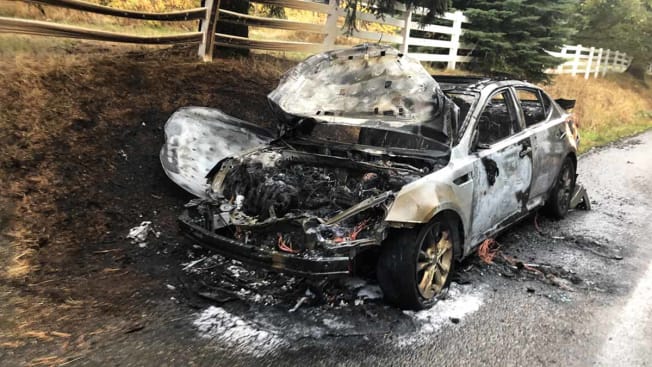Antilock Braking Systems (ABS)
Many other recalls involve a component in the antilock braking system (ABS) known as the hydraulic electronic control unit (HECU, shown below).
Although the cause is still under investigation, the ABS and HECU recalls may be related to short circuits within electrical parts that could cause a fire. These fires may occur even when the vehicle is parked, which is why Hyundai and Kia have advised some owners to park outside and away from structures and other vehicles until a recall repair is done. Hyundai and Kia have replaced components on some vehicles and are
still working on a fix for other models.
Other Causes
Other fire risks are due to a wide variety of causes. In the case of a recent Kia Telluride recall, a contaminated circuit board could be at fault. Michael Brooks, executive director of the Center for Auto Safety, says that some of these problems are caused by software that wasn’t tested properly, while others are related to mistakes made during the supplier’s manufacturing process. “That suggests they’re not doing the proper quality control in their facilities,” Brooks says.
Compounding the problem is that both automakers have so many parts and designs in common that when something goes wrong it affects a large number of vehicles.
Both Hyundai and Kia provided written statements in response to CR’s questions about the recalls.
“Hyundai actively monitors and evaluates potential safety concerns, including non-collision fires, with all our vehicles,” Hyundai’s statement read in part. The company also noted that “the number of recalls does not mean there were actual vehicle fires, rather an analytical fire risk.”
In its statement, Kia said it continuously evaluates its vehicles, including “the investigation of allegations of vehicle fire, determination of cause and origin where possible, evaluation of the potential for more fires from the same identified cause, and initiation of a recall if the data shows a previously undiscovered defect trend poses an unreasonable risk of harm to members of the public.”
Both automakers have also made recent safety-related investments, including the development of new safety data analysis programs and research facilities. Some of these initiatives were mandated by NHTSA and partly paid for through civil penalties levied by the agency.
Which Hyundai and Kia Vehicles Have Been Recalled?
Recalled Hyundais include the
Accent,
Azera,
Elantra,
Genesis,
Ioniq,
Kona,
Palisade,
Santa Cruz,
Santa Fe,
Santa Fe Sport, Santa Fe XL,
Sonata,
Tucson, and
Veloster. Recalled Kias include the
Cadenza,
Carnival,
Forte,
K5,
K900,
Niro,
Optima,
Seltos,
Sedona,
Soul,
Sorento,
Spectra,
Sportage,
Stinger, and
Telluride. The Genesis
G70,
G80, and
GV80 are also included. (Genesis is Hyundai’s luxury brand.)
Documents that Hyundai and Kia have submitted to NHTSA show that
hundreds of thousands of owners have not yet had crucial recall work done on their vehicles, including some cars and SUVs that shouldn’t be parked near structures or other vehicles.
“If you have one of the affected cars or know someone that might have one, make sure the recall gets done,” says Jake Fisher, senior director of CR’s auto test center. “It may not be convenient, but it could save your property and even your life.”
Why So Many Hyundai and Kia Vehicles Are Getting Recalled for Fire Risk - Consumer Reports


sw






